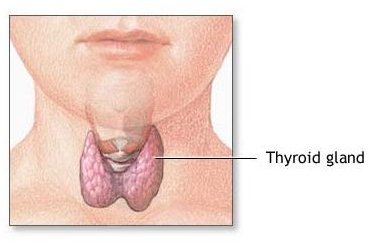sTSH Blood Test: Detect Mild Thyroid Failure Earlier
What is TSH?
Thyroid Stimulating Hormone, or TSH, is produced by the pituitary gland. It regulates the function of the thyroid gland.
What does the Thyroid Gland do?
The thyroid gland, located in the front of the neck, produces hormones (T3, T4 and calcitonin) that regulate several body functions, including temperature regulation, metabolism (how the body makes energy for activity and to function and maintain itself) and blood calcium levels.
Image: Wikimedia Commons License: Public Domain: United States Federal Government
What is the sTSH Blood Test?
TSH is measured to determine the amount of Thyroid Stimulating Hormone circulating in the blood. sTSH, or sensitive TSH, is a 3rd generation blood test that is more accurate than previous generations of the test. Because of it’s sensitivity, diagnosis of thyroid problems can be made earlier, sometimes leading to treatment or monitoring before any symptoms have developed.
This link will take you to an article that presents a brief overview of thyroid laboratory tests.
Often the lab results report received by a patient will simply refer to TSH when in fact a sTSH lab test was done. There are also enhanced version of the sTSH assay called high sensitivity TSH (hTSH) or ultra sensitive TSH (uTSH) blood tests. All of these terms are sometimes used interchangeably.
How is this test done?
There is no functional difference in how a sTSH test is done vs a TSH test. There will be a blood draw, a lab analysis, and an interpretation of the results
Why is a sTSH blood test done?
This test may be ordered for many reasons.
It is useful in the diagnosis of:
- hypothyroidism (under-active thyroid, including Hashimoto’s disease)
- mild thyroid failure (sub-clinical hypothyroidism)
- hyperthyroidism (over-active thyroid, including Graves’ disease)
- some types of thyroiditis
- some kinds of female infertility
- pituitary gland dysfunction
It is used for routine screening of:
- newborns (routinely done in the United States)
- adults (controversial screening for all adults, but often recommended for high risk groups or women over 50)
Additional reasons to order this test are:
- monitoring of patients receiving thyroid replacement medications
- confirmation of TSH suppression in certain treatments for thyroid cancer
What do the results mean?
There are a number of possible interpretations of sTSH blood test results that are out of the reference range (normal range). Most of these apply to the standard TSH blood test as well.
A high value indicates that the pituitary gland is producing too much Thyroid Stimulating Hormone. Possible reasons for this are:
-
hypothyroidism caused by an underactive thyroid gland (this includes a diagnosis of Hashimoto’s disease)
-
a TSH-secreting tumor on the pituitary gland causing an overproduction of TSH (secondary hyperthyroidism)
-
a patient being treated for a thyroid disorder (often hypothyroidism) is not receiving enough thyroid hormone medication
-
mild thyroid failure with sub-clinical hypothyroidism - only detectable by a sensitive TSH blood test (sTSH)
Additional tests may be needed to determine the proper diagnosis.
A low value indicates that the pituitary gland is not producing enough Thyroid Stimulating Hormone. Possible reasons are:
-
hyperthyroidism caused by an overactive thyroid gland (this includes a diagnosis of Graves’ disease)
-
a tumor or damage to the pituitary gland that causes it to under-produce TSH (secondary hypothyroidism)
-
a malfunctioning hypothalamus that fails to instruct the pituitary gland to produce TSH (tertiary hypothyroidism)
-
a patient being treated for a thyroid disorder is receiving too much thyroid hormone medication
-
mild thyroid failure with sub-clinical hyperthyroidism - only detectable by a sensitive or high sensitivity TSH blood test
Additional tests may be needed to determine the proper diagnosis.
Normal values
- if symptoms suggest possible hypothyroidism, but sTSH values are normal, further testing should be done to diagnose or rule out secondary hypothyroidism (pituitary dysfunction) or tertiary hypothyroidism (hypothalamus dysfunction)
Atypical values
- rarely, particularly in the case of secondary or tertiary causes, the lab results will be the opposite of what might be expected. This is due to the nature of the feedback mechanisms at work that compensate for abnormal production of the several hormones involved. Additional tests will be necessary in these cases to arrive at an accurately diagnosis.
Resources
Mayo Clinic Medical Laboratories (2010): https://www.mayomedicallaboratories.com/test-catalog/Overview/8939
Lab Tests Online (2010): https://www.labtestsonline.org/understanding/analytes/tsh/test.html
